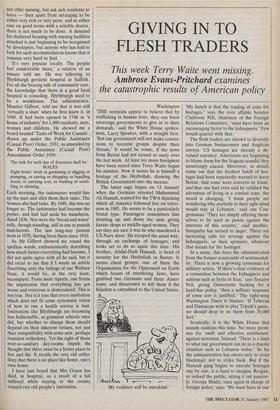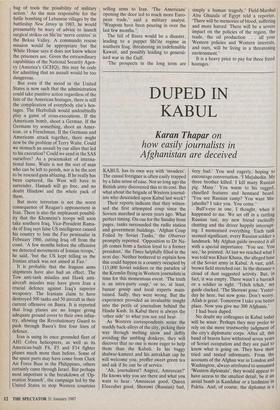GIVING IN TO FLESH TRADERS
This week Terry Waite went missing.
Ambrose Evans-Pritchard examines
the catastrophic results of American policy
Washington `THE terrorists appear to believe that by trafficking in human lives, they can force sovereign governments to give in to their demands,' said the White House spokes- man, Larry Speakes, with a straight face. `But our government will not make conces- sions to terrorist groups despite their threats.' It would be comic, if the news from Beirut had not turned so nasty over the last week. At least ten more foreigners have been seized since Terry Waite began his mission. Now it seems he is himself a hostage of the Hezbollah, drawing the British Government into the morass.
The latest saga began on 13 January when the Germans arrested Muhammad Ali Hamidi, wanted for the TWA hijacking which all America followed live on televi- sion in 1985. He seems to be a particularly brutal type. Passengers remembers him strutting up and down the aisle giving karate chops to middle-aged women. They say they are sure it was he who murdered a US Navy diver. He escaped the usual way, through an exchange of hostages, and looks set to do so again this time. His brother, Abdul-Hadi Hamadi, is head of security for the Hezbollah in Beirut. It seems client groups, one of them the Organisation for the Oppressed on Earth which boasts of murdering Jews, have grabbed two Germans and three Amer- icans, and threatened to kill them if the hijacker is extradited to the United States.
'My evidence will be anecdotal.' `My hunch is that the trading of arms for hostages,' says the ever affable Senator Claiborne Pell, chairman of the Foreign Relations Committee, 'must have been an encouraging factor to the kidnappers.' Few would quarrel with that.
The flesh traders are shrewd to diversify into German businessmen and Anglican envoys. US hostages are already a de- valued currency. Americans are beginning to blame them for the Iraguan scandal they unwittingly caused. Moreover, as details come out that the freshest batch of hos- tages had been repeatedly warned to leave Beirut, that some were converts to Islam, and that one had even said he relished the adventure of living in a combat zone, the mood is changing. 'I think people are wondering why anybody in their right mind would stay in Lebanon,' said one Con- gressman. 'They are simply offering them- selves to be used as pawns against the interests of this country,' said another. Sympathy has turned to anger. There are increasing calls for revenge against the kidnappers, or their sponsors, whatever that means for the hostages.
In a sense, this frees the administration from the former constraints of sentimental- ity. There is now a growing consensus for military action. 'If there's clear evidence of a connection between the kidnappers and nations such as Syria or Iran,' says Senator Pell, giving Democratic backing for a hard-line policy, 'then a military response of some sort is justified.' The right-wing Washington Times is blunter: 'If Teheran and Damascus wish to play Tripoli's game, we should drop in on them from 30,000 feet.'
Ironically, it is the White House that sounds cautious this time. No more prom- ises for 'swift and effective retribution' against terrorists. Instead, 'There is a limit to what our government can do in a chaotic situation such as Lebanon today.' So far the administration has sworn only to resist blackmail: not to strike back. But if the Hamadi gang begins to execute hostages one by one, it is hard to imagine Reagan, or indeed the public, sitting it out passive- ly. George Shultz, once again in charge of foreign policy, says: 'We must have in our bag of tools the possibility of military action.' As the man responsible for the futile bombing of Lebanese villages by the battleship New Jersey in 1983, he would presumably be wary of advice to launch surgical strikes on Shi'ite 'nerve centres' in the Bekaa Valley. A commando rescue mission would be appropriate but the White House says it does not know where the prisoners are. Given the extraordinary capabilities of the National Security Agen- cy (America's GCHQ), this may be code for admitting that an assault would be too dangerous.
But even if the mood in the United States is now such that the administration could take punitive action regardless of the fate of the American hostages, there is still the complication of everybody else's hos- tages. The Hezbollah would undoubtedly play a game of cross-executions. If the Americans bomb, shoot a German. If the Germans try something, shoot an Amer- ican, or a Frenchman. If the Germans and Americans attack together, there might now be the problem of Terry Waite. Could we stomach an assault by our allies that led to his execution? Could we send in the SAS ourselves? As a peacemaker of interna- tional fame, Waite is not the sort of man who can be left to perish, nor is he the sort to be rescued guns ablazing. If he really has been captured, the West will have to surrender. Hamadi will go free, and no doubt Hindawi and the whole pack of them.
But more terrorism is not the worst consequence of Reagan's appeasement in Iran. There is also the unpleasant possibil- ity that the Khomeini's troops will soon take southern Iraq. Vice-President Rama- da of Iraq says false US intelligence caused his country to lose the Fao peninsular in February 1986, cutting Iraq off from the coast. 'A few months before the offensive we detected movements of Iranian troops,' he said, 'but the US kept telling us the Iranian attack was not aimed at Fao.'
It is probable that the Iraguan arms shipments have also had an effect. The Tow anti-tank missiles and Hawk anti- aircraft missiles may have given Iran a crucial defence against Iraq's superior weaponry. The Iranians claim to have destroyed 500 tanks and 50 aircraft in their current offensive on Basra. It is reported that Iraqi planes are no longer giving adequate ground cover to their own infan- try, allowing the Revolutionary Guard to push through Basra's first four lines of defence.
Iran is using its once grounded fleet of AH1 Cobra helicopters, as well as its American-built F4, F5 and F14 fighter planes much more than before. Some of the spare parts may have come from Clark Air Force Base in the Philippines, others certainly came through Israel. But perhaps most important is the breakdown of 'Op- eration Staunch', the campaign led by the United States to stop Western countries selling arms to Iran. 'The Americans' opening the door led to much more Euro- pean trade,' said a military analyst. `Weapons have been pouring in over the last few months.'
The fall of Basra would be a disaster, leading to a puppet Shi'ite regime in southern Iraq, threatening an indefensible Kuwait, and possibly leading to general- ised war in the Gulf.
`The prospects in the long term are simply a human tragedy,' Field-Marshal Abu Ghazala of Egypt told a reporter. `There will be memories of blood, suffering and more hatred. There will be a severe impact on the policies of the region, the trade, the oil production . . . all your Western policies and Western interests, and ours, will be living in a threatening environment.'
It is a heavy price to pay for three freed hostages.




































 Previous page
Previous page